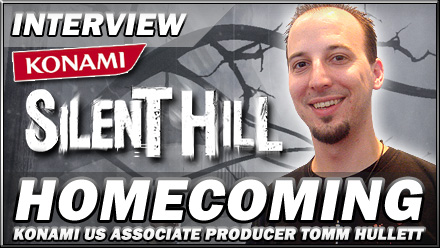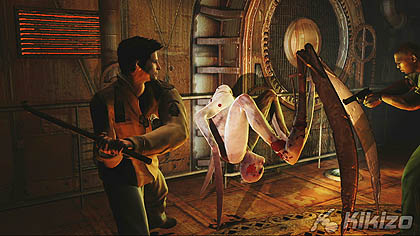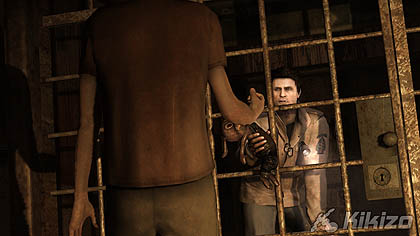Silent Hill Homecoming: Konami Interview
Can Silent Hill still make a noise on current-gen platforms? We discuss with the game's producer.

Page: 1 2
As a property, Silent Hill represents something of a quandary. On the one hand, Konami's decade-old disturb-em-up franchise is patently in need of a reboot: almost every aspect, from the wooden combat mechanics to the schizophrenic setting and its violent allegorical inhabitants, has been refigured or transcended by the crop of younger, livelier horror IPs now settling into their second or third incarnations. On the other, there's a quality to Silent Hill which remains Silent Hill's alone, however archaic or ubiquitous the individual components, and woe betide the developer who endangers that quality in the name of progress.
It's a predicament that Konami US Associate Producer Tomm Hullett understands well. "I think it's important to note that we're not trying to change what Silent Hill is," he told us shortly before our first jaunt into Silent Hill Homecoming, the series' current generation debut. "Resident Evil got more action-oriented, and that works for Resident Evil because Resident Evil is more about dogs jumping through mirrors, while Silent Hill has this mood to maintain - that dread... the longer you play the more worried you get, and the harder it is to recover when you turn the game off. Silent Hill needs that, regardless of what you try to put in it."
While Hullett speaks highly of Silent Hill 4, with its radical structural departures, Homecoming advances the formula by "small degrees" rather than giant leaps. "We have a combat system that's a little upgraded, some character interaction stuff that's different, but we tried to keep the rest of it pretty similar, so even if the fans don't like what we've changed they have enough there to still feel like this is a Silent Hill game. Just maybe there are some elements they don't like as much."
One such element may be the new setting - not Silent Hill itself, but the grubby little burg of Shepherd's Glen. New protagonist Alex Shepherd has just returned from military service, only to find his brother and father missing, his mother reduced to a stupor and his hometown encased in mysterious fog. Of course, it isn't long before the action proceeds to those bloodied alleyways and decrepit corridors we know so well, and in any case Hullett stresses that Silent Hill is more of a psychological state, a unique, private nightmare, than a physical location.
That applies to the Double Helix team, a merger of Foundation 9 studios The Collective and Shiny Entertainment, as much as the unfortunate Alex. "Every developer on the team has their own Silent Hill that they think of as, y'know - this is my Silent Hill," Hullett goes on. "I think Silent Hill 2 is the most powerful one for a couple of reasons - obviously [there's] the psychological aspect, but also just the revelations as you go through the game, not just with James but with all the side characters too. Silent Hill for me is when you're talking to Angela on the flaming staircase, and you realise that this is what her hell-world is like... And you realise Silent Hill is different for everyone."
"We've had some negative reactions where people have been saying 'why isn't it in Silent Hill? It can't take place in this sort of place,'" he admits. "But if Silent Hill's different for James and different for Angela, it can take place somewhere else too, and then what implications does that have?"
What indeed. Exploring implications and, by extension, origins remains a defining part of the Silent Hill experience, and that's where Homecoming's fleshed-out roster of peripheral characters comes in."You never control anyone but Alex, but the other characters do play a part a couple of times - and not just his family." Hullett picks an example from the populace of Shepherd's Glen. "This person saved a bus full of kids a few years ago, but now he's THIS guy - why? There's this disconnection - the person you think would be this and the person you meet - so you learn about what changed this guy, what happened to make him this way."
One consequence of this new focus is the prevalence of branching dialogue pathways, but impatient souls can rest easy - Homecoming isn't 100% back-story. If you'd rather flail around in the present with an absolute minimum of chitchat, Double Helix is happy to oblige. "There's this mix of options where if you just want to know where you need to go, the character says that in the cut scene," Hullett explains. "If you want more they will offer it in a branching conversation.
"So early in the game Alex comes home and he meets his mom and there's a cut scene, like you'd expect, but after the cut scene she's still sitting there and you can walk up and talk to her if you want. And you can ask her about a bunch of different things, and she'll give you more background - on how come the fence outside is broken, or why are you not talking much, or whatever.
"We recognise that a lot of Silent Hill fans like the story, and they want more," he continues. "They want to feel like they're in this world and these characters are real. So adding in these branching dialogues lets us do that without troubling those players who just want to get through the game and get to the end - cause they don't really care about the story, so if we made a 40 minute cut scene they'd skip it anyway."
It might be interjected at this point that action-driven gamers are more likely to be deterred by the flaccid combat model, a perennial Silent Hill bugbear. Hullett is quick to acknowledge this failing of previous titles. "In the old games the enemy would come up to you and you'd hit it a couple of times and it would fall over, and that was it - which kind of took away from the fear factor because sure, he looks scary, but if you know his pattern you can just kill him. And what's the point?"
Page: 1 2













 Satoru Iwata Video Interview - the late Nintendo president spoke with Kikizo in 2004 as 'Nintendo Revolution' loomed.
Satoru Iwata Video Interview - the late Nintendo president spoke with Kikizo in 2004 as 'Nintendo Revolution' loomed. Kaz Hirai Video Interview - the first of Kikizo's interviews with the man who went on to become global head of Sony.
Kaz Hirai Video Interview - the first of Kikizo's interviews with the man who went on to become global head of Sony. Ed Fries Video Interview - one of Xbox's founders discusses an epic journey from Excel to Xbox.
Ed Fries Video Interview - one of Xbox's founders discusses an epic journey from Excel to Xbox. Yu Suzuki, the Kikizo Interview - we spend time with one of gaming's most revered creators.
Yu Suzuki, the Kikizo Interview - we spend time with one of gaming's most revered creators. Tetris - The Making of an Icon: Alexey Pajitnov and Henk Rogers reveal the fascinating story behind Tetris
Tetris - The Making of an Icon: Alexey Pajitnov and Henk Rogers reveal the fascinating story behind Tetris Rare founders, Chris and Tim Stamper - their only interview? Genuinely 'rare' sit down with founders of the legendary studio.
Rare founders, Chris and Tim Stamper - their only interview? Genuinely 'rare' sit down with founders of the legendary studio. The History of First-Person Shooters - a retrospective, from Maze War to Modern Warfare
The History of First-Person Shooters - a retrospective, from Maze War to Modern Warfare